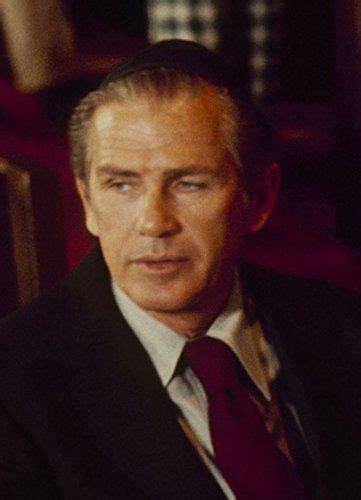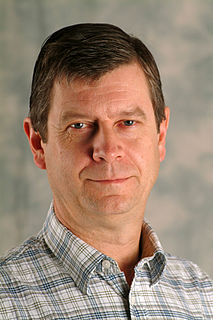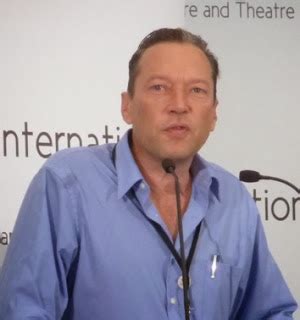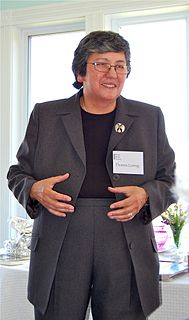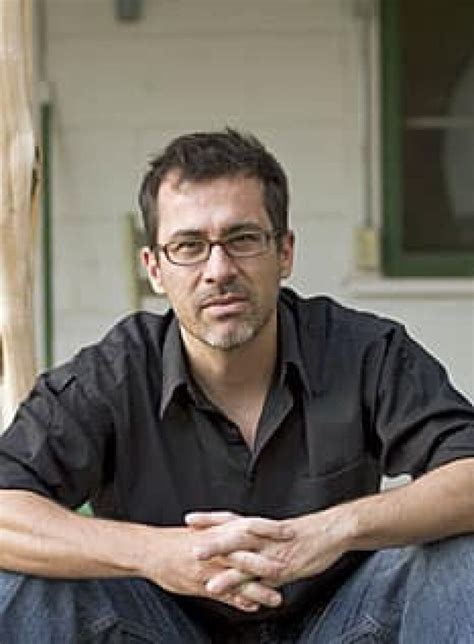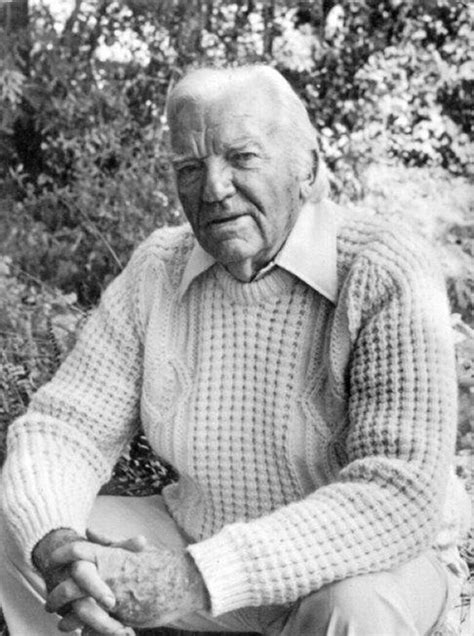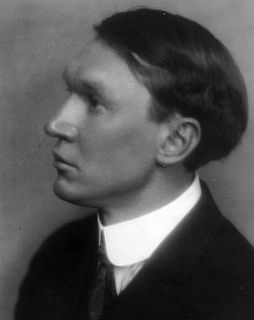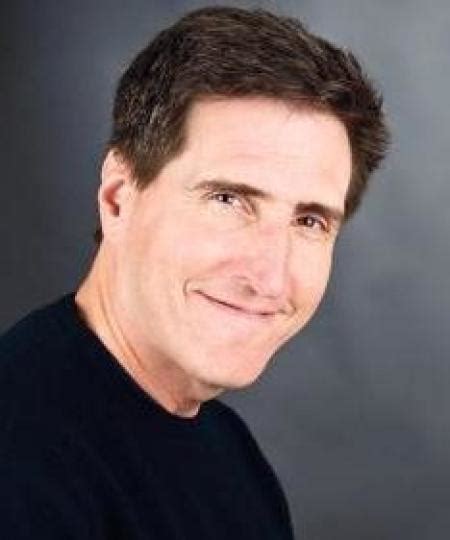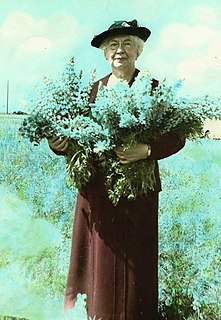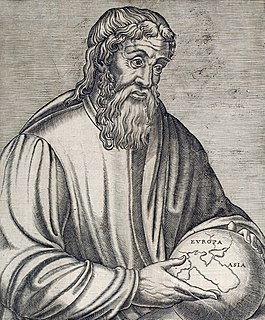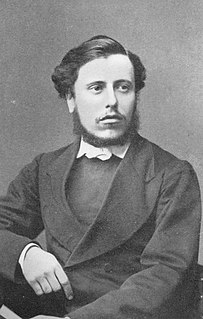Top 532 Tribe Quotes & Sayings - Page 9
Explore popular Tribe quotes.
Last updated on April 16, 2025.
Suppose hypothetically that one out of every 200 people or so is a jerk. In today's world these jerks will discover that if they enter government or business they can become super rich and powerful jerks. Do we conclude, therefore, that markets (or government) have caused greed? No, the fact is that once we no longer live in tiny tribes of 200, anonymity allows some people, who would have been assholes in a small tribe but who would have been sanctioned there, to go off and become jerks on a much, much larger scale.
I am committed to furthering the self-determination of Indian communities but without terminating the special relationship between the Federal Government and the Indian people. I am strongly opposed to termination. Self-determination means that you can decide the nature of your tribe's relationship with the Federal Government within the framework of the Self-Determination Act, which I signed in January of 1975.
The interesting thing about that is one of the greatest critics of socialism and leftwing writings was Robert Michels who wrote a series of essays called "The Iron Law of Oligarchy" and in these essays he discusses how no matter what sorts of freedoms are advertised or put into a society structure, that all societies, all form of governments - whether they be a Roman republic, whether they be a democracy, whether they be a Russian communist system, whatever, a tribe... a tribal council - all of the continuously, throughout the ages, have all converted back into an oligarchy.
Here in the United States we're now consuming about three gallons of petroleum per person per day. That's twenty pounds of oil per person per day. We only consume about four pounds of oxygen per person per day. We're consuming five times more oil each day, here in the United States than we are oxygen. We've become the oil tribe.
Oh, September! It is so soon for you to lose your friends to good work and strange loves and high ambitions. The sadness of that is too grown-up for you. Like whiskey and voting, it is a dangerous and heady business, as heavy as years. If I could keep your little tribe together forever, I would. I do so want to be generous. But some stories sprout bright vines that tendril off beyond our sight, carrying the folk we love best with them, and if I knew how to accept that with grace, I would share the secret.
Every time another tribe becomes extinct and their language dies, another way of life and another way of understanding the world disappears forever. Even if it has been painstakingly studied and recorded, a language without a people to speak - it means little. A language can only live if its people live, and if today's uncontacted tribes are to have a future, we must respect their right to choose their own way of life.
Thou knowest how numerous this tribe is, how united and how powerful in the assemblies. I will plead in a low voice so that only the judges may hear, for instigators are not lacking to stir up the crowd against me, and against all the best citizens. To scorn, in the interest of the Republic, this multitude of Jews so often turbulent in the assemblies shows a singular strength of mind. The money is in the Treasury; they do not accuse us of theft; they seek to stir up hatreds.
We must dress according to the dictates of fashion, make love whether we feel like it or not, kill in the name of our country, wish time away so that retirement comes more quickly, elect politicians, complain about the cost of living, change our hairstyle, criticize anyone who's different, go to a religious service and beg forgiveness for our sins and puff ourselves up with pride because we know the truth and despise the other tribe who worships a false god.
The intelligent and good man holds in his affections the good and true of every land -- the boundaries of countries are not the limitations of his sympathies. Caring nothing for race, or color, he loves those who speak other languages and worship other gods. Between him and those who suffer, there is no impassable gulf. He salutes the world, and extends the hand of friendship to the human race. He does not bow before a provincial and patriotic god -- one who protects his tribe or nation, and abhors the rest of mankind.
Both sameness and difference are issues for us. A sign of cultural homogenization is that languages are disappearing at an alarming rate. I am heartened by signs that some peoples are fighting back, e.g., the revitalization of the language of the Wampanoag tribe in Massachusetts. But if we reject essentialism about culture, we will be cautious about overgeneralizing about what homogenization is and to what degree it exists. If we think of cultures as dynamic, internally diverse and contested, we will be aware that what looks like homogenization may be deeper down this more complicated thing.
Part of Sykes's motive was rooted in religiosity. A devout Catholic, he regarded a return of the ancient tribe of Israel to the Holy Land as a way to correcta nearly two-thousand-year-old wrong. That view had taken on new passion andurgency with the massacres of the Armenians. To Sykes, in that ongoing atrocity, the Ottoman Empire had proven it could never again be trusted to protectits religious minority populations. At war's end, the Christian and Jewish HolyLand of Palestine would be taken from it, and the failure of the Crusades maderight.
Look at native cultures - they've lasted for tens of thousands of years, not doing everything right. We wouldn't want to emulate them in many ways, but their basic philosophies - being a part of nature, a part of a tribe or group without elevating, not what you call dominator philosophies - they lasted for tens of thousands of years. It took us to come and put them asunder.
There is not much talking now. A silence falls upon them all. This is no time to talk of hedges and fields, or the beauties of any country. Sadness and fear and hate, how they well up in the heart and mind, whenever one opens pages of these messengers of doom. Cry for the broken tribe, for the law and the custom that is gone. Aye, and cry aloud for the man who is dead, for the woman and children bereaved. Cry, the beloved country, these things are not yet at an end. The sun pours down on the earth, on the lovely land that man cannot enjoy. He knows only the fear of his heart.
There are many reasons why the general public doesn't really understand our monetary system. In the first place, money is something that people tend to get emotional about. After all, money involves, and always has involved, something closely akin to faith-which probably explains why in many past societies the money system has been in the hands of a priesthood, the subject of magical rites, and the ceremonial services of the tribe's medicine man.
We will not wish we had made more money, acquired more stuff, lived more comfortably, taken more vacations, watched more television, pursued greater retirement, or been more successful in the eyes of this world. Instead, we will wish we had given more of ourselves to living for the day when every nation, tribe, people, and language will bow around the throne and sing the praises of the Savior who delights in radical obedience and the God who deserves eternal worship.
The Hopi, an Indian tribe, have a language as sophisticated as ours, but no tenses for past, present and future. The division does not exist. What does this say about time? Matter, that thing the most solid and the well-known, which you are holding in your hands and which makes up your body, is now known to be mostly empty space. Empty space and points of light. What does this say about the reality of the world?
I moved to Des Moines when I was 15. I asked my mother to give up costody and sign parental rights over to my grandmother, who I lived with while I went to school. I was clean and finally starting to figure myself out. I can only say that now without laughing. I was still very out of my own place, and I didn't even know what that place was. All I knew was that I could write music, that I had no idea what that could mean and that I was still surrounded by people I couldn't relate to. I hadn't found my tribe yet.
We had no churches, no religious organizations, no sabbath day, no holidays, and yet we worshiped. Sometimes the whole tribe would assemble to sing and pray; sometimes a smaller number, perhaps only two or three. The songs had a few words, but were not formal. The singer would occasionally put in such words as he wished instead of the usual tone sound. Sometimes we prayed in silence; sometimes each one prayed aloud; sometimes an aged person prayed for all of us. At other times one would rise and speak to us of our duties to each other and to Usen. Our services were short.
The Penobscot took an initial poll of people in the state to determine if there was support for opening a casino, and the poll came back very favorable. As we moved forward, a commercial was aired that said if the tribe opened a casino the law would allow kids to gamble and had an image of a kid pulling a slot machine. Here it was our idea and we got massacred, and someone else ended up with what we wanted; it's sort of like history repeating itself.
In ascending order the qualities of Patriotism are: 1. To work, fight, or die for your own survival. 2. To work, fight, or die for your immediate family. 3. To work, fight, or die for a group, extended family, tribe, or clan. 4. To work, fight, or die for a group too large for all the individuals to know each other. 5. To work, fight, or die for a way of life.
No tribe has the right to sell, even to each other, much less to strangers.... Sell a country! Why not sell the air, the great sea, as well as the earth? Didn't the Great Spirit make them all for the use of his children? The way, the only way to stop this evil is for the red man to unite in claiming a common and equal right in the land, as it was first, and should be now, for it was never divided." We gave them forest-clad mountains and valleys full of game, and in return what did they give our warriors and our women? Rum, trinkets, and a grave.
The desire for guidance, love, and support prompts men to form the social or moral conception of God. This is the God of Providence, who protects, disposes, rewards, and punishes; the God who, according to the limits of the believer's outlook, loves and cherishes the life of the tribe or of the human race, or even of life itself; the comforter in sorrow and unsatisfied longing; he who preserves the souls of the dead. This is the social or moral conception of God.
Most do not fully see this truth that life is difficult. Instead they moan more or less incessantly, noisily or subtly, about the enormity of their problems, their burdens, and their difficulties as if life were generally easy, as if life should be easy. They voice their belief, noisily or subtly, that their difficulties represent a unique kind of affliction that should not be and that has somehow been especially visited upon them, or else upon their families, their tribe, their class, their nation, their race or even their species, and not upon others.
The culture in which you parent, mentor, or educate boys exhorts them to be individualistic and group-oriented at once, but does not give them a tribal structure in which to accomplish both in balance. It used to be that the tribe formed a boy's character while the peer group existed primarily to test and befriend that character. Nowadays, boys' characters are often formed in the peer group. Mentors and intimate role models rarely exist to show the growing boy in any long-term and consistent way how both to serve a group and flourish as an independent self.
Those who become hyperpolyglots are those who meet two criteria. One, they are exposed to language material. Two, they undertake learning languages as a mission as well as acquiring the personal identity as a language learner.I describe the "neural tribe theory" of hyperpolyglots, arguing that they possess an atypical neurology that is selected by some environments and not others; presumably, there have always been humans walking around with that set of neurological traits or factors, only some of whom actually use those things for languages.
Many of our tribe went to the cliff each night to count the number killed during the day. They counted the dead otter and thought of the beads and other things that each pelt meant. But I never went to the cove and whenever I saw the hunters with their long spears skimming over the water, I was angry, for these animals were my friends. It was fun to see them playing or sunning themselves among the kelp. It more fun than the thought of beads to wear around my neck.
The idea that each individual has intrinsic, God-given value and is of infinite worth quite apart from any social contribution - an idea most pagans would have rejected as absurd - persists today as the ethical basis of western law and politics. Our secularized western idea of democratic society owes much to that early Christian vision of a new society - a society no longer formed by the natural bonds of family, tribe, or nation but by the voluntary choice of its members.
Talk to me 20 years ago and I had a complete sense of illegitimacy as an American Muslim. I felt like I wasn't authentic. But I don't understand and I don't believe or subscribe to this idea that I don't have a right to speak as a Muslim because I'm an American. Being Muslim is to accept and honor the diversity that we have in this world, culturally and physically, because that's what Islam teaches, that we are people of many tribes. I think the American Muslim experience is of a different tribe than the Saudi Muslim world, but that doesn't make us less than anyone else.
The sun is a huntress young,
The sun is a red, red joy,
The sun is an Indian girl,
Of the tribe of the Illinois.
The sun is a smouldering fire,
That creeps through the high gray plain,
And leaves not a bush of cloud
To blossom with flowers of rain.
The sun is a wounded deer,
That treads pale grass in the skies,
Shaking his golden horns,
Flashing his baleful eyes.
The sun is an eagle old,
There in the windless west.
Atop of the spirit-cliffs
He builds him a crimson nest.
We have to remember that we're no longer competing for anything anymore. We're not competing for life and death. Now we need to go back to when we would raise our children together and be able to have that strong unit of community, which is our strength. So women together, as a tribe, to me, are the strongest force. But we were put in a position to have to compete with each other, and that's got to stop. We've got to know that whenever that creeps up in our head, that that's not our true nature. That was something that was embedded in us, and that needs to start to go away.
God sent Jesus to join the human experience, which means to make a lot of mistakes. Jesus didn't arrive here knowing how to walk. He had fingers and toes, confusion, sexual feelings, crazy human internal processes. He had the same prejudices as the rest of his tribe: he had to learn that the Canaanite woman was a person. He had to suffer the hardships and tedium and setbacks of being a regular person. If he hadn't the incarnation would mean nothing.
I should like to see any power of the world destroy this race, this small tribe of unimportant people, whose wars have all been fought and lost, whose structures have crumbled, literature is unread, music is unheard, and prayers are no more answered. Go ahead, destroy Armenia . See if you can do it. Send them into the desert without bread or water. Burn their homes and churches. Then see if they will not laugh, sing and pray again. For when two of them meet anywhere in the world, see if they will not create a New Armenia.
A hole had just appeared in the Galaxy. It was exactly a nothingth of a second long, a nothingth of an inch wide, and quite a lot of million light years from end to end. As it closed up [...] Two hundred and thirty-nine thousand lightly fried eggs fell out of it...materializing in a large woobly heap on the famine-struck land of Poghril in the Pansel system. The whole Poghril tribe had died out from famine except for one last man who died of cholesterol poisoning some weeks later.
Wait, we can not break bread with you. You have taken the land which is rightfully ours. Years from now my people will be forced to live in mobile homes on reservations. Your people will wear cardigans, and drink highballs. We will sell our bracelets by the road sides, and you will play golf, and eat hot h'ors d'ourves. My people will have pain and degradation. Your people will have stick shifts. The gods of my tribe have spoken. They said do not trust the pilgrims, especially Sarah Miller. And for all of these reasons I have decided to scalp you and burn your village to the ground.
A true community consists of individuals - not mere species members, not couples - respecting each others individuality and privacy while at the same time interacting with each other mentally and emotionally - free spirits in free relation to each other - and co-operating with each other to achieve common ends. Traditionalists say the basic unit of "society" is the family; "hippies" say the tribe; noone says the individual.
Oh, ants, my sisters, good old honeydew-seekers! From close up you are sticky and shiny and gristly; and your nymphs have parasitic red mites stuck to them. You are too intent upon your chewing and gathering to listen to me, but I tell you that despite my warm feelings I really do not like you, and I cannot feel sorry for you in any way because there are too many of you and you are not cute at all. You eat too much of my forests; you are a rebellious tribe, and I will destroy you; I will poison your nests with sweet-smelling traps.
When anesthesia was developed, it was for many decades routinely withheld from women giving birth, since women were "supposed" to suffer. One of the few societies to take a contrary view was the Huichol tribe in Mexico. The Huichol believed that the pain of childbirth should be shared, so the mother would hold on to a string tied to her husband's testicles. With each painful contraction, she would give the string a yank so that the man could share the burden. Surely if such a mechanism were more widespread, injuries in childbirth would garner more attention.
They called themselves the Munrungs. It meant The People, or The True Human Beings. It's what most people call themselves, to begin with. And then one day the tribe meets some other People or, if it's not been a good day, The Enemy. If only they'd think up a name like Some More True Human Beings, it'd save a lot of trouble later on
There may have been somewhere, as a few eighteenth-century philosophers dreamed, a group of peaceful men who got together one evening after work and drew up a Social Contract to form the state. But nobody has been able to find an actual record of it. Practically all the governments whose origins are historically established were the result of conquest-of one tribe by another, one city by another, one people by another. Of course there have been constitutional conventions, but they merely changed the working rules of governments already in being.
To me, the thing that sets us apart from so many other animal species is our ability to ask questions, investigate, gather information, come to our own conclusions, and sometimes depart from the pack, sometimes move away from the tribe. And I'm not seeing a lot of that right now among a sizable portion of American politics and American voters. I'm not seeing that kind of use of critical thinking, and it really, really freaks me out.
Gary Shteyngart has written a memoir for the ages. I spat laughter on the first page and closed the last with wet eyes. Un-put-down-able in the day and a half I spent reading it, Little Failure is a window into immigrant agony and ambition, Jewish angst, and anybody's desperate need for a tribe. Readers who've fallen for Shteyngart's antics on the page will relish the trademark humor. But here it's laden and leavened with a deep, consequential, psychological journey. Brave and unflinching, Little Failure is his best book to date
This tug-of-war often obscures what's also happening between us. I am your mother, the first mile of your road. Me and all my obvious and hidden limitations. That means that in addition to possibly wrecking you, I have the chance to give to you what was given to me: a decent childhood, more good memories than bad, some values, a sense of tribe, a run at happiness. You can't imagine how seriously I take that - even as I fail you. Mothering you is the first thing of consequence that I have ever done.
In the deep jungles of Africa, a traveler was making a long trek. Coolies had been engaged from a tribe to carry the loads. The first day they marched rapidly and went far. The traveler had high hopes of a speedy journey. But the second morning these jungle tribesmen refused to move. For some strange reason they just sat and rested. On inquiry as to the reason for this strange behavior, the traveler was informed that they had gone too fast the first day, and that they were now waiting for their souls to catch up with their bodies.
A strange thing has happened - while all the other arts were born naked, this, the youngest, has been born fully-clothed. It can say everything before it has anything to say. It is as if the savage tribe, instead of finding two bars of iron to play with, had found scattering the seashore fiddles, flutes, saxophones, trumpets, grand pianos by Erhard and Bechstein, and had begun with incredible energy, but without knowing a note of music, to hammer and thump upon them all at the same time.
Three classes inhabited the city (Alexandria in Egypt): first the Aegyptian or native stock of people, who were quick-tempered and not inclined to civil life; and secondly the mercenary class, who were severe and numerous and intractable...; and, third, the tribe of the Alexandrians, who also were not distinctly inclined to civil life, and for the same reasons, but still they were better than those others, for even though they were a mixed people, still they were Greeks by origin and mindful of the customs common to the Greeks.
It is only in times of social dissolution, as in the last age of the small Semitic states, when men and their gods were alike powerless before the advance of the Assyrians, that magical superstitions based on mere terror, or rites designed to conciliate alien gods, invade the sphere of tribal or national religion. In better times the religion of the tribe or state has nothing in common with the private and foreign superstitions or magical rites that savage terror may dictate to the individual.
I have the mohawk,even though people still call it the mohawk I say "I don't wanna be disrespectful to the Mohican Indians but there is a tribe in Africa called the Mandinka warriors." They're in the west coast of Africa in the country of Mali.I was reading National Geographic Magazine back in 1977, and I saw the warrior standing there with his spear and his beads around his neck and whatnot and the stuff on his ankles. That was what gave me the idea, I said "Wow, let me bring respect to them," so basically what I wear is called a Mandinka cut.
The Old and New Testaments are the stick of Judah. You recollect that the tribe of Judah tarried in Jerusalem and the Lord blessed Judah, and the result was the writings of the Old and New Testaments. But where is the stick of Joseph? Can you tell where it is? Yes. It was the children of Joseph who came across the waters to this continent, and this land was filled with people, and the Book of Mormon or the stick of Joseph contains their writings, and they are in the hands of Ephraim
Then must you speak Of one that loved not wisely but too well, Of one not easily jealous but, being wrought, Perplexed in the extreme; of one whose hand, Like the base Indian, threw a pearl away Richer than all his tribe; of one whose subdued eyes, Albeit unused to the melting mood, Drop tears as fast as the Arabian trees Their medicinable gum. Set you down this, And say besides that in Aleppo once, Where a malignant and a turbaned Turk Beat a Venetian and traduced the state, I took by th' throat the circumcised dog And smote him thus.
Some communities don't permit open, honest inquiry about the things that matter most. Lots of people have voiced a concern, expressed a doubt, or raised a question, only to be told by their family, church, friends, or tribe: "We don't discuss those things here." I believe the discussion itself is divine. Abraham does his best to bargain with God, most of the book of Job consists of arguments by Job and his friends about the deepest questions of human suffering, God is practically on trial in the book of Lamentations, and Jesus responds to almost every question he's asked with...a question.
I've spent years studying words. Linguistics, language, the power of words, the power of phrases on human beings. All of that. It's part of my, almost obsessive, fascination. It turns out that there are some keys that we all need to know about how conversations impact us, because they do at a chemical level. There are certain things that if we learned this, it would totally change our interactions with others, and that's the following. There are certain words that have a feeling of, "I love you, I care for you, you're in my tribe."
